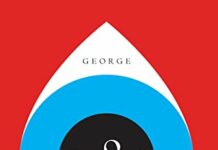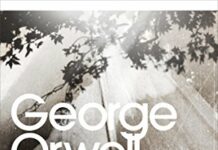
Ebook Info
- Published: 1969
- Number of pages: 228 pages
- Format: EPUB
- File Size: 0.00 MB
- Authors: George Orwell
Description
A National Review Top Ten Best Nonfiction Books of the Century. “One of Orwell’s very best books and perhaps the best book that exists on the Spanish Civil War.” — The New Yorker In 1936, originally intending merely to report on the Spanish Civil War as a journalist, George Orwell found himself embroiled as a participant—as a member of the Workers’ Party of Marxist Unity. Fighting against the Fascists, he described in painfully vivid and occasionally comic detail life in the trenches—with a “democratic army” composed of men with no ranks, no titles, and often no weapons—and his near fatal wounding. As the politics became tangled, Orwell was pulled into a heartbreaking conflict between his own personal ideals and the complicated realities of political power struggles.Considered one of the finest works by a man V. S. Pritchett called “the wintry conscience of a generation,” Homage to Catalonia is both Orwell’s memoir of his experiences at the front and his tribute to those who died in what he called a fight for common decency. This edition features a new foreword by Adam Hochschild placing the war in greater context and discussing the evolution of Orwell’s views on the Spanish Civil War. “No one except George Orwell . . . made the violence and self-dramatization of Spain so burning and terrible.” — Alfred Kazin, New York Times “A wise book, one that once read will never be forgotten.” — Chicago Sunday Tribune
User’s Reviews
Reviews from Amazon users which were colected at the time this book was published on the website:
⭐Few wars in history have attracted the interest of more literary celebrities than the Spanish Civil War (1936-1939). (In addition to Orwell, who actually fought in the war, Hemingway and Emma Goldman famously covered it.) Almost no war, however, is both more pivotal to 20th century history and less understood by young and old alike today.That it was a complicated war is a profound understatement. While it was, on the surface, a face off between the Nationalists and the Republicans, the participants represented a dizzying array of political affiliations—fascists, anarchists, socialists, revolutionaries, communists, and an impressive contingent of foreigners generally supportive of Western democrat principles.More famous for “Animal Farm” and “1984”, both of which were written later, this might be Orwell’s most insightful book. Contrary to other great writers who gained profound insight through their genius, Orwell gained his insight through his unwavering realism and ability to see things for what they are. (The realism is so candid, in fact, that you will laugh out loud in places where other authors might make you sigh in despair.)In this case he dispels the romanticism of war and the idealism of communism. While the intelligentsia around the world were debating the lofty ideals of the proletarian struggle, the democratic ideal, and the dignity of all men, Orwell points out, life in the trenches is far less political. The priorities there are warmth, sustenance, and, if you’re lucky, a useable weapon.Franco and the Nationalists/Fascists won the war, Orwell ultimately concludes, not for any ideological reason, but for the simple reason that they had better weapons and a more robust supply chain, thanks to the support of Italy and Germany. The Republic enjoyed no foreign support other than that of Russia, ironically enough, but the Russian agenda was ultimately not Spain, but the Stalinist brand of communism.This is, I believe, a hauntingly relevant portrayal, with different names, of the current political situation in much of the West. The diversity and range of our political tribes and sub-tribes is mystifying, to say the least. In the US, for example, there are the never-Trump conservatives, the traditional conservatives, the centrists, the liberals, the progressives, the socialists, and, of course, the Trumpers.All of these tribes, however, are defined by romantic ideals, in much the same way that the parties to the Spanish Civil War were. Seldom, however, do those ideals touch down in the reality people actually face in their day-to-day lives. And it is this disconnect, I believe, that is at the heart of the anger, frustration, and resulting hostility the US is experiencing today. Ideals are not reality.Sometimes, as in this book, it is the mundane and simple aspects of reality that give rise to the most profound idealism. That is certainly the case here, where Republican soldiers at the front were cooperating and forging connections between tribes while their counterparts, far removed from the fighting, were literally killing each other based on minor and little understood or relevant differences in ideology that few people could even articulate.Orwell wrote a masterpiece, and he wrote it well, and I strongly suggest you indulge in it. It is a much more contemporary story than you might expect.
⭐Book itself is good but the kindle edition formatting is unbelievably bad. Words constantly show up with underscores before and after _like_ _this_. I think those are supposed to be italicized words. Every time there is a single quote mark before a t the t shows up really small for some reason. Also, there are paragraph breaks at seemingly random points, often in the middle of sentences. This was clearly a poorly done machine scan with no copy editing done at all.
⭐Well written. The details of life as a foot soldier are excellent. The lack of decent arms for the men and women on the front lines makes you wonder how this conflict lasted as long as it did. However, I had a difficult time trying to keep tabs of all the different factions involved in this war. Providing the initials of the different factions only made it more confusing. I had no idea there was a difference between Communists and Socialists as well as Anarchists and Fascists. And all the different trade union armies. Not to mention Falangists and Monarchists. I lost track of who was fighting whom. Who are the bad guys? the alliances of Franco or the government? If a flag was the only way to identify who was who it must have been a nightmare to fight in this war. Now I realize how important it is to have uniforms so soldiers can sort out who is who – especially in the street battle of Barcelona. This review will not help you decide to buy the book or not–I bought it based on the reputation of the author. George Orwell puts you there on the roof tops and in the trenches in his vivid descriptions.
⭐”It is impossible to read through the reports in the Communist Press without realizing that they are consciously aimed at a public ignorant of the facts and have no other purpose than to work up prejudice.” This statement toward the end of his tale is a good summary of what Orwell’s experience in the Spanish Revolution taught him and how his writing was influenced from that point forward. It is also important for modern readers to understand how our own forms of mass communication are used with similar objectives.This excellent autobiographical history covers a period of seven months when Eric Blair, a/k/a George Orwell, put his leftist principles in action by joining the anarchist contingent of the forces fighting for the Spanish Republic. It is a frank confession of the experiences which disabused him of any reverence for Soviet communism and put his life in danger as an enemy of the Republic’s international sponsors.All educated readers are familiar with Orwell’s famous later works, but readers of “Homage to Catalonia” will have a far deeper understanding of how and why he arrived at the principles that guided them. Read this book at your earliest opportunity and cherish it forever after.
⭐George Orwell’s engrossing memoir of his time fighting in the Spanish Civil War. Written almost more as a diary, vid vid with details of the madness and chaos of the War – particularly among the innumerable factions within the Republican side. I had no idea the variety of socialist, communist, anarchist, democratic, Trotskyite, Stalinist, etc etc groups fighting General Franco and his forces. The lack of weapons, the eventual turning upon and purging of these groups by others, and Orwell’s eventual disillusionment are eye opening. What’s also horrifying is how the outright persecution, deliberate destruction and desiccation of churches. The tens of thousands of simple priests and nuns lined up against walls and shot for simply being religious is one of the least remarked upon genocides of the 20th century.
⭐I had to buy this again. I was 21 when I read this. Now, I’m 45. I’m a life long socialist and this book sums up perfectly how the left always fights itself more than the opposition. This is the book I always quote whenever the left turns in on itself (which is always!.) “My cause is more important than your cause etc.” is pretty much the left. 70 odd years later, it’s still the same lol. UK Labour party..are you watching! Classic book!
⭐If you’ve read “1984” and “Animal Farm”, and want more of the same author’s superb prose, this book is worth your time. Non-fiction like “The Road to Wigan Pier”, unlike that book this one focuses on a struggle outside Britain – the Spanish Civil War, a conflict that nowadays tends to be relegated to a footnote in history. So if you are unfamiliar with the events and participating factions, let George Orwell be your guide. His descriptions of his experiences (including a serious neck wound) are intentionally unsparing, and designed to strip away any glamour attached to war and highllight both the periodic brutality and routine squalor. Highly recommended.
⭐Orwell had six rules for good writing:Never use a metaphor, simile or other figure of speech that you are used to seeing in printNever use a long word where a short one will doIf it is possible to cut a word out, always cut it out.Never use the passive where you can use the activeNever use a foreign phrase, a scientific word or a jargon word if you can think of an everyday English equivalentBreak any of these rules sooner than say anything outright barbarous These rules pretty much describe Orwell’s own writing style, which is simple and straightforward, yet elegant and engaging. He was a man who lived a very full and somewhat eccentric life, giving up a career in the Burmese police force to wander around Britain as a Tramp and to live in poverty in Paris. He was very connected to working people and so understandably was drawn to the socialist side against Franco’s Fascists in the Spanish Civil War (1936-9).This is a remarkably detailed account of an ordinary foot soldier’s life in wartime – comparable to Robert Graves’ `Goodbye to All That’ about his time in the trenches in WW1. Orwell doesn’t have the big picture of how the war is going or what the strategy is but can see the hopeless organisation and pitiful logistics of the Socialists. He’s cold, hungry, ill clothed and badly armed but it’s remarkable how cheerful he and his comrades remain. I would guess that this is an almost universal account of the nonsense of war from a soldier’s point of view.In the second part of the book he goes on leave to Barcelona and gives an account of the complex political rivalry between the socialist factions. As an account of the home front this is less successful as the political infighting seems ridiculously petty and un-affecting compared to the soldier’s life. Eventually however the group to which Orwell belongs (POUM) losses the political fight and becomes a banned organisation so that he has to flee Spain to avoid arrest.In many ways this is bang up-to-date – I can well believe that anti-government groups in, say, the Arab spring are very much like Orwell’s socialists – fervent for their cause, but badly equipped and divided politically. To that extent this is a very modern book that has some universal truths about revolution and political change and which is well worth reading.
⭐Having previously thought the Spanish civil war was purely a right against fascism but Orwell’s considered account explains the war within the war between the anti fascist forces in a frank and honest way. His account underscores the brutality and camaraderie of war but also the boredom suffered at the front whilst creating images of the environment he was fighting in. As all good reporters Orwell asks readers to look at accounts other than his own to get a balanced view and has inspired further reading. He also criticised writers who commented on the infighting without having be an in Spain to witness directly what had happened. Very interesting read
⭐Cover Reflects the war. 5/5Contents. When looking for a book to read about the Spanish Civil War I found this with a comment it was well written.I need some help to untangle the reasons for and progress of the war kafter seeing Michael Portillo introduce a series of programmes using old colour film footage on late night TV.Yes, the book is clearly written as recommended by others although only reflects the early stages of the war as George Orwell managed to escape a Spanish prison. His descriptions of being shot are to me classic description and writing.On reading about Stroud yesterday It appears George Orwell spent much time in a sanitorium in the town before his early deathI am usually not a fan of extra commentary written in books written by others but in this case the notes were helpful. Orwell also cautioned about others views of the war. I will bear this warning in mind.Alexander of the Allrighters and Ywnwab!
Keywords
Free Download Homage To Catalonia in EPUB format
Homage To Catalonia EPUB Free Download
Download Homage To Catalonia 1969 EPUB Free
Homage To Catalonia 1969 EPUB Free Download
Download Homage To Catalonia EPUB
Free Download Ebook Homage To Catalonia




